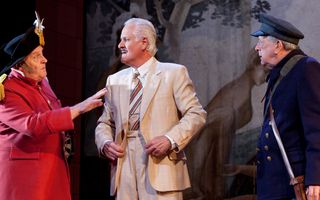
In this task, students are familiarised with Shakespeare’s language. They are given the opportunity to ‘translate’ his words into modern English, and to practice saying them aloud. Students are also introduced to the performative aspect of the language, and to the fact that the way the words are spoken will influence their meaning.
... the son and heir of a mongrel bitch...
Act 1, Scene 4
Shakespeare’s plays are well known for the amazing insults contained in them.
Part 1 - Individual and group task:
A. At the start of Act 2, Scene 2, Lear’s loyal friend Kent unleashes a startling and highly inventive list of insults on the disrespectful Oswald, a servant of Lear’s daughter Goneril. Kent is incensed because Oswald has insulted King Lear.
- Copy at least ten of Kent’s insults into your own notes.
- Write down a modern-day equivalent for each insult, to help you understand them more clearly. Your challenge is to avoid taking the easy route and using swear words. (Note: Some of the words may not be familiar to you. You might need to look up what they mean.)
- Take your list of Kent’s insults from Shakespeare’s play (use the original words, rather than your modern translation). This is your script. Walk around the room and address each person you meet with one of Kent’s insults. They will offer one of their insults to you in return. Don’t move on until you have exchanged insults.
B. As you move around the room, practice saying these insults using different tones of voice. You might deliver an insult with an angry tone the first time, and then follow it with a tone that is friendly, bemused, superior, condescending, kind, threatening, hurt, dismissive or aggressive. The choice is yours.
Part 2 - Individual task:
When King Lear insults Goneril and Regan, his words are rich with the imagery of pain, disease, poison and predatory birds and beasts. They vividly reveal his disapproval and anger towards his two eldest daughters.
Lear calls Goneril a “detested kite” (Act 2, Scene 2) whose ingratitude is “sharper than a serpent’s tooth” (Act 1, Scene 3). Lear describes her face as “wolvish” (Act 1, Scene 3) and her tongue as “serpent like” (Act 2, Scene 2). In his madness he compares Goneril and Regan to “pelican daughters” (Act 3, Scene 4). In Medieval legend, it was said that pelicans would give their own blood to feed their starving young. Lear believes his daughters are feeding themselves on his blood. Lear also curses his daughters. He wishes that Regan may bear children who will make her unhappier than his children have made him and curses Goneril with infertility.
C. Research
There are many other insults that Lear offers his two daughters, aside from the ones listed above. Read through the play and collect all the insults and curses you can find that Lear directs at Goneril and Regan. Look up any words you are not sure of.
D. Monologue
Imagine you are Lear. Your daughters have demanded that you abandon your knights and come and live quietly with them. Insulted, you think that they have no respect for you.
Compose a monologue in contemporary language, in which you insult Goneril and Regan for their treatment of you. Again, avoid using swear words. The trick here is to use Lear’s original insults as your inspiration and find a way to express similar emotions in modern English. Compare Goneril and Regan to things you hate or that have negative associations with, just as Shakespeare did. You might compare them to animals, poisonous creatures or diseases.




